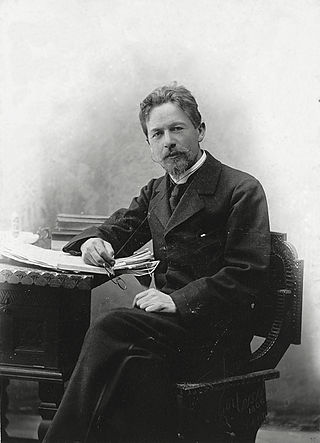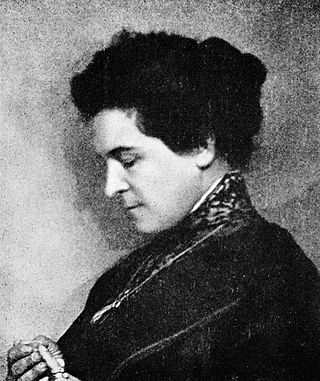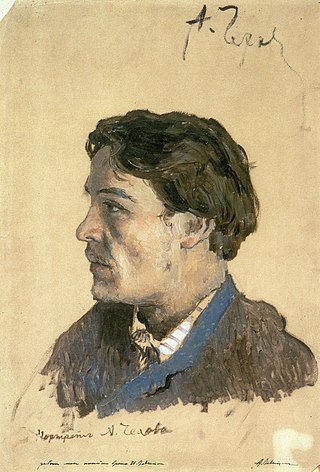Related Research Articles

Anton Pavlovich Chekhov was a Russian playwright and short-story writer who is considered to be one of the greatest writers of all time. His career as a playwright produced four classics, and his best short stories are held in high esteem by writers and critics. Along with Henrik Ibsen and August Strindberg, Chekhov is often referred to as one of the three seminal figures in the birth of early modernism in the theatre. Chekhov was a physician by profession. "Medicine is my lawful wife", he once said, "and literature is my mistress."
Michael Frayn, FRSL is an English playwright and novelist. He is best known as the author of the farce Noises Off and the dramas Copenhagen and Democracy.

The Seagull is a play by Russian dramatist Anton Chekhov, written in 1895 and first produced in 1896. The Seagull is generally considered to be the first of his four major plays. It dramatizes the romantic and artistic conflicts between four characters: the famous middlebrow story writer Boris Trigorin, the ingenue Nina, the fading actress Irina Arkadina, and her son the symbolist playwright Konstantin Treplev.

Uncle Vanya is a play by the Russian playwright Anton Chekhov. It was first published in 1898, and first produced in 1899 by the Moscow Art Theatre, directed by Konstantin Stanislavski.

The Cherry Orchard is the last play by Russian playwright Anton Chekhov. Written in 1903, it was first published by Znaniye, and came out as a separate edition later that year in Saint Petersburg, via A.F. Marks Publishers. It opened at the Moscow Art Theatre on 17 January 1904 in a production directed by Konstantin Stanislavski. Chekhov described the play as a comedy, with some elements of farce, though Stanislavski treated it as a tragedy. Since its first production, directors have contended with its dual nature. It is often identified as one of the three or four outstanding plays by Chekhov, along with The Seagull, Three Sisters, and Uncle Vanya.
Chekhov's gun is a narrative principle that states that every element in a story must be necessary, and irrelevant elements should be removed. For example, if a writer features a gun in a story, there must be a reason for it, such as it being fired sometime later in the plot. All elements must eventually come into play at some point in the story. Some authors, such as Hemingway, do not agree with this principle.

Olga Leonardovna Knipper-Chekhova was a Russian and Soviet stage actress. She was married to Anton Chekhov.

The Moscow Art Theatre was a theatre company in Moscow. It was founded in 1898 by the seminal Russian theatre practitioner Konstantin Stanislavski, together with the playwright and director Vladimir Nemirovich-Danchenko. It was conceived as a venue for naturalistic theatre, in contrast to the melodramas that were Russia's dominant form of theatre at the time. The theatre, the first to regularly put on shows implementing Stanislavski's system, proved hugely influential in the acting world and in the development of modern American theatre and drama.

Hockey Club Vityaz Moscow Region is a professional ice hockey team based in Podolsk, Moscow Oblast, Russia. They are members of the Bobrov Division of the Kontinental Hockey League. In the first few seasons of the KHL, the team was widely known for playing a tough and physical North American-influenced style of hockey.
Ivanov is a four-act drama by the Russian playwright Anton Chekhov.

The Chekhov Gymnasium in Taganrog on Ulitsa Oktyabrskaya 9 is the oldest gymnasium in the South of Russia. Playwright and short-story writer Anton Chekhov spent 11 years in the school, which was later named after him and transformed into a literary museum. Visitors can see Anton's desk and his classroom, the assembly hall and even the punishment cell which he sometimes visited.

The birthplace of Anton Chekhov is the place in Taganrog, Russia, where the famous writer Anton Chekhov was born. It is now a writer's house museum. The outbuilding on the territory of a property on Chekhov Street in Taganrog was built in 1859 of wattle and daub, plastered and whitened. The area taken up by the small outbuilding is 30.5 sq. meters. The house and grounds were owned by the merchant Gnutov in 1860, and by the petit bourgeois Kovalenko in 1880–1915.

Anton Chekhov was a Russian playwright and short-story writer who is considered to be among the greatest writers of short fiction in history. He wrote hundreds of short stories, one novel, and seven full-length plays.
Platonov is the name in English given to an early, untitled play in four acts written by Anton Chekhov in 1878. It was the first large-scale drama by Chekhov, written specifically for Maria Yermolova, rising star of Maly Theatre. Yermolova rejected the play and it was not published until 1923.

The Bear: A Joke in One Act, or The Boor, is a one-act comedic play written by Russian author Anton Chekhov. The play was originally dedicated to Nikolai Nikolaevich Solovtsov, Chekhov's boyhood friend and director/actor who first played the character Smirnov.

Melikhovo is a writer's house museum in the former country estate of the Russian playwright and writer Anton Chekhov. Chekhov lived in the estate from March 1892 until August 1899, and it is where he wrote some of his most famous plays and stories, including The Seagull and Uncle Vanya. The estate is about forty miles south of Moscow near Chekhov.
The Wood Demon is a comedic play in four acts by Anton Chekhov.

Vanya and Sonia and Masha and Spike is a comedy play written by Christopher Durang. The story revolves around the relationships of three middle-aged single siblings, two of whom live together, and takes place during a visit by the third, Masha, who supports them. They discuss their lives and loves, argue, and Masha threatens to sell the house. Some of the show's elements were derived from works of Anton Chekhov, including several character names and sibling relationships, the play's setting in a country house with a vestigial cherry orchard, the performance of an "avant-garde" play by one of the main characters, and the themes of old vs. new generations, real vs. assumed identities, the challenges of a woman growing older after successes in a career that seems to be ending, the hope and carelessness of youth, intrafamilial rivalries, and the possible loss of an ancestral home.

"Ionych" is an 1898 short story by Anton Chekhov.

Isaac Ilyich Levitan was a classical Russian landscape painter who advanced the genre of the "mood landscape".
References
- ↑ "Why Chekhov has never been busier". TheGuardian.com . 20 March 2013.